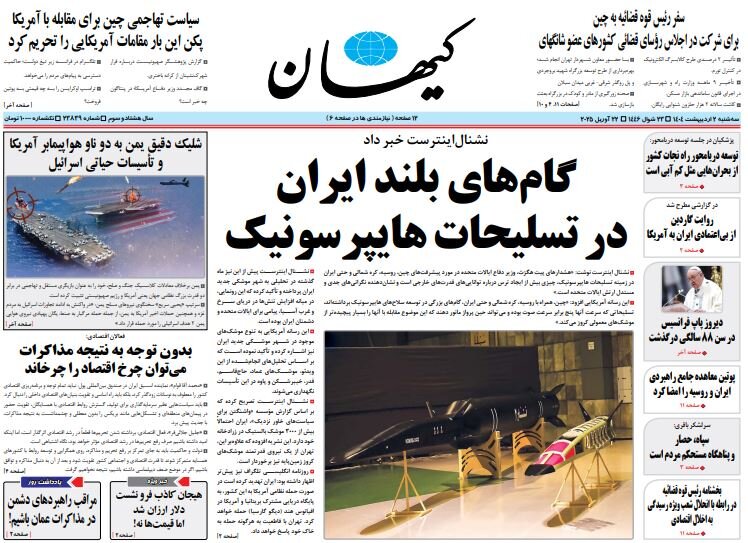Beware of the enemy's strategies in the Oman talks

TEHRAN - Kayhan devoted its editorial to the need for vigilance by the Iranian negotiating team with the U.S. in Oman and wrote: The third round of negotiations is scheduled to be held again next Saturday in Muscat, and like the second round, it will be indirect.
Both our nuclear team and the American side know that the main points of disagreement are over the enrichment level, giving guarantees to lift sanctions, and the order of steps to return to commitments. However, Trump's sixty-day deadline to reach an agreement and the role of Oman's mediation could lead the course of negotiations either toward progress or a deadlock. Our experience with the JCPOA and the policy that the Americans have always followed in discussions should have proven by now that with more than two decades of talks on the nuclear issue, there is no way for any mistakes or errors. Therefore, the nuclear team, especially the expert team that is scheduled to enter into the details of any agreement starting on Wednesday (April 23), should pay attention to every word of the American side so that a mistake like the text of the JCPOA is not repeated.
Siasat-e-Rooz: Moving in the right direction
Siasat-e-Rooz dedicated its editorial to Foreign Minister Abbas Araqchi's visit to Beijing, arguing: One of the important goals of Araqchi's visit to China is to continue consultations and the role that China would play in the nuclear negotiations. Although indirect negotiations are currently underway between Iran and the United States, and some talks have also taken place with the Europeans, Tehran emphasizes that it will never forget the role and position of China and Russia and will take advantage of their capacities against the behavior of the West. Iran, China, and Russia are the main players of a new world order against the West’s destructive unilateralism. They emphasize that the world no longer needs the crisis-generating nature of capitalism and needs new approaches. Achieving this requires intensive and numerous consultations, and Araqchi's visit to Beijing could be a step in this direction. Evidence shows that the United States, despite claims that it seeks negotiations, is putting together a puzzle to encircle the three countries militarily. In these circumstances, it seems that the convergence of the three countries against this military conspiracy is an undeniable necessity.
Jam-e-Jam: Trump's unstable behavior is a major challenge in negotiations
Jam-e-Jam discussed the possibility of Trump accepting Iran's rightful demands in negotiations in an interview with Dr. Seyyed Mohammad Marandi, a political analyst. He said: Trump's behavior and decisions in recent years have always been accompanied by instability and sudden turns. We have witnessed this instability both in the trade war and in regional issues such as the Gaza genocide, where one day he is in favor of a ceasefire and the next day he is in favor of genocide. Regarding Iran's nuclear activities, one day he makes harsh statements and the next day he becomes mild. It is impossible to make accurate predictions about Trump. Of course, this makes the path of negotiations more difficult. The key point is that even if any agreement is reached with the United States, the certainty that the American side will remain committed to its obligations is still accompanied by serious doubts. The United States’ history of violating its commitments, coupled with Trump's unpredictability, are two factors that should not be ignored. Therefore, it is not possible to draw a precise vision of the future of the negotiations at this time.
Farhikhtegan: Diplomacy may be a trap to justify harsh measures
One of the most likely scenarios in U.S.-Iran relations is the use of diplomatic negotiations as a trap to justify harsh measures, such as attacks on Iranian nuclear facilities or resistance groups in the region, especially in Yemen. In this scenario, Donald Trump’s initial positive statements and strategic silence are part of a possible plan designed to present the United States as a good-willed negotiator. However, the main goal may be to cause the negotiations to fail by making unacceptable demands and then legitimizing military action or new sanctions by claiming “Iran’s lack of cooperation.” Numerous pieces of evidence support this possibility. A military attack on Iran could have far-reaching consequences, including escalating regional tensions and retaliatory attacks on U.S. military bases. Also, the response of resistance groups in Yemen and Lebanon could widen the scope of the conflict and impose heavy political and economic costs on the United States and its allies. The history of American foreign policy shows that such strategies have been used in the past, and the possibility of their repetition cannot be ignored.
Leave a Comment